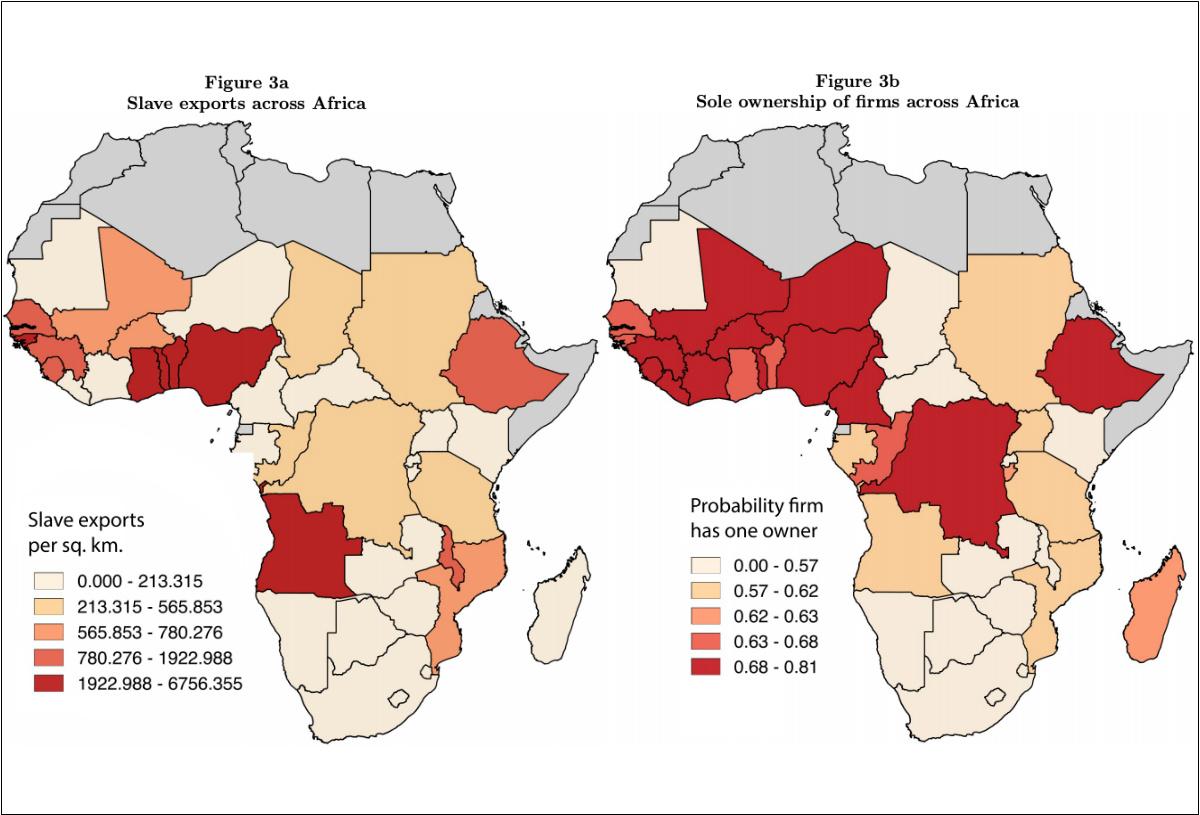Olin research: Slave trade’s effect on firm ownership persists today
- January 10, 2020
- By Kurt Greenbaum
- 3 minute read

The effects of the African slave trade persist today among firms in parts of the continent, with companies more often tightly controlled by individuals or families—often because those firms have limited access to equity funding and shared ownership.
Meanwhile, firms in African countries less affected by the slave trade have more diversified ownership structures.

While closely held ownership isn’t necessarily bad, research from a WashU Olin professor suggests some African firms may miss 21st century growth opportunities without the ability to raise capital through shared ownership.
“The slave trade appears to predict ownership structure in ways that nothing else can explain,” said Lamar Pierce, Olin professor of organization and strategy and coauthor of the new study.
In particular, the research showed that manufacturing firms—heavily dependent on investment capital through debt or equity—tend to have much more closely held ownership structures in countries heavily affected by slavery, primarily in western and central Africa.
Although ownership concentration can be very useful, not having the option to diversify ownership is bad.
Lamar Pierce
Pierce and his coauthor, Jason A. Snyder of the University of Utah, outline their conclusions in “Historical Origins of Firm Ownership Structure: The Persistent Effects of the African Slave Trade,” forthcoming in the Academy of Management Journal.
The work builds on the pair’s August 2017 research in The Review of Financial Studies, which showed that firms in countries heavily affected by the slave trade now have more limited access to forms of financing such as bank loans or lines of credit.
That research, in turn, builds on work from other researchers who created a database linking nearly 81,000 enslaved people to 52 modern African countries. Pierce and Snyder cross-referenced that data with extensive data on firms from the World Bank Enterprise Survey.
‘Business scholars aren’t studying Africa’
Pierce said he and Snyder could not definitively say the slave trade caused the later concentration of corporate ownership. But no other variable they investigated could explain the relationship, including weather, colonialism, natural resources such as gold or oil, access to coastlines or the distance to demand markets.
And there is some evidence that the relationship is indeed causal.
“One thing that raises our confidence is that a whole bunch of historians have studied this,” Pierce said. The researchers’ model suggests that 67% of firms in countries with above-median slave exports would have sole proprietorship. In contrast, countries below the median for slave exports have 46% sole ownership.
Furthermore, it implies that the difference in the percentage of sole proprietorships between the lowest and the highest slave trade countries is 43 percentage points.
Pierce’s and Snyder’s work is early in a burgeoning area of business research focused on the African continent.
“Business scholars aren’t studying Africa. They just aren’t,” Pierce said. “It’s an incredibly rapidly growing continent economically. Exploding literacy rates, dramatically improving political institutions.”
Although some question whether this research can be generalized beyond Africa, he wonders whether it needs to be, given that the continent represents one-sixth of the world’s population.
“I never hear that question when I do research on US firms. It’s a valuable question to ask, but not when it comes to questioning the validity of the research,” he said. “Understanding the role of firms is important in and of itself.”
‘Traumatic shock’
In this and their previous research, Pierce and Snyder set out to understand the lingering effects of a massive “traumatic shock” that reduced the continent’s population by half between the 15th and 19th centuries, when 12 million to 18 million Africans were seized into slavery.
Their 2017 paper provided “the first evidence that the slave trade shaped modern markets by restricting financial contracting between firms,” Pierce and Snyder wrote. “More specifically, they show that firms cannot access credit or banking services.”
This new paper suggests that African nations historically affected by the slave trade tend to have weak institutions that are unable to enforce the existence of contracts. Because they also have weaker and more concentrated social networks and trust, “ownership must remain concentrated even when not beneficial.”
Pierce and Snyder wanted to build on a call within the research community to advance research on African business and “to bring history back into the fields of management and strategy.”
“If you eyeball the variation in economic development as a function of the slave trade and you look at the low-slave-trade countries,” Pierce said, “you can see a huge difference in them.”
Media inquiries
For assistance with media inquiries and to find faculty experts, please contact Washington University Marketing & Communications.
Monday–Friday, 8:30 to 5 p.m.
Sara Savat
Senior News Director, Business and Social Sciences
